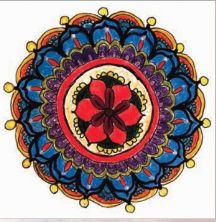In many cultures and traditions, the practice of anointing with oil has deep spiritual roots. Essential oils, made from concentrates of various plant essences, have been used for centuries to promote physical, emotional, and spiritual well-being. In Judy’s work as a spiritual director, she loved to explore using different oils and their healing properties. This was something she delighted in learning about and discussing with anyone she crossed paths with who was versed in this ancient practice still very applicable today.
So, of course, when Patsy, a worker in her hospice facility came into Judy’s room and offered to give her “an essential oils bath,” even in her deeply medicated state Judy acknowledged her question and agreed. I also nodded gratitude for what was to happen. Patsy explained she would begin with a regular bath and end with a special blend of essential oils. It didn’t take long for everyone present to realize that this was no ordinary bath; Patsy was anointing Judy for death. Suddenly we became part of a sacred, centuries-old human ritual, sharing this incredibly holy ground. As Joni Keim, co-author of Aromatherapy and Subtle Energy Techniques, explains, “Anointing with essential oils creates a sacred space, a ritual that helps the soul transition gently and with grace.”
I tell this story in our book It All Belongs: Love, Loss, and Learning to Live Again, for the sole purpose of sharing this important but seldom talked about practice and its profound significance for people in life’s final stages—and for their loved ones. For the dying person, an oil bath is an ultimate gesture of love, compassion, and care to help release the burdens of our physical world as they prepare to transition.
When Patsy asked me for permission to give Judy an essential oil bath and massage, she was responding to an earlier conversation she had with Judy. She knew that Judy understood how this ritual would bring calm and comfort when her time was growing near. They had discussed how Frankincense, for example, enhances spiritual connection and inner peace. I could see in Patsy’s earnest expression how much she truly desired to offer this comfort to help Judy prepare for her transition.
Patsy hummed and whispered to Judy as she lovingly massaged, caressed, and tended to Judy’s body, soul, and spirit with a special blend of oils known for their properties of offering comfort and peace. What I didn’t realize as this ritual began was how this gift of anointing Judy was also a gift to me and three other dear friends in Judy’s room. As I watched this tender scene unfold, I received Patsy’s sacred ritual in a new way—as an opportunity for loved ones to enter into a shared, sacred space of love and support during their final moments. Holy ground.
We had only known Patsy since Judy arrived at the hospice facility. Watching Patsy care for Judy in this way was a humbling and exquisite model of how to give oneself to a stranger with no reservations. In The Complete Guide to Aromatherapy, author Salvatore Battaglia writes: “The act of anointing can be as meaningful for those giving the care as it is for the one receiving it, fostering a connection that transcends the physical.”
Watching peace and serenity settle over Judy during and after this profound experience, I could sense a deep soothing of her physical, emotional, and spiritual discomfort. In Patsy’s gracious expression of love and care, I knew Judy felt cherished and honored by what I knew she understood as a final blessing, swaddling her in love, compassion, and divine comfort.
For someone nearing the end of life, incorporating spiritual practices like essential oil baths can significantly enhance not only their immediate quality of life, but it is also within the peaceful environment these rituals provide that the dying person can prepare to face their final journey with dignity and grace. As the Hospice Foundation of America explains, “Complementary therapies like aromatherapy can be an important part of end-of-life care, offering not only physical relief but also spiritual comfort.”
Many, if not most, of us view death with fear—or at least a degree of uncertainty. In the sacred ritual of an essential oils bath—an anointing—we receive a gentle reminder of the beauty and sanctity of life’s final passage. As we share the experience of this little-known bridge between the physical and spiritual worlds, we become part of helping our loved ones find peace in their transition.
I’ve thought a lot about this experience of Judy’s anointing, and in the years since I’ve come to realize how Judy was not the only one anointed that day. While essential oils baths indeed offer tangible comfort to the dying, becoming part of their sacred experience extends anointing to all others present who bear witness.
In Christian traditions, anointing with oil symbolizes the Holy Spirit’s presence, a healing, and blessing that goes beyond our physical world. To be anointed is to be chosen, to be blessed with a purpose, to be sent in a new direction. Perhaps in Judy’s anointing, I was being anointed, chosen to tell Judy’s story, our story, my story—no matter how hard it would always be. Perhaps I was sent in this new direction with this passion I feel for carrying the many messages of It All Belongs far and wide, offering a resource and companion to others traveling similar paths.

